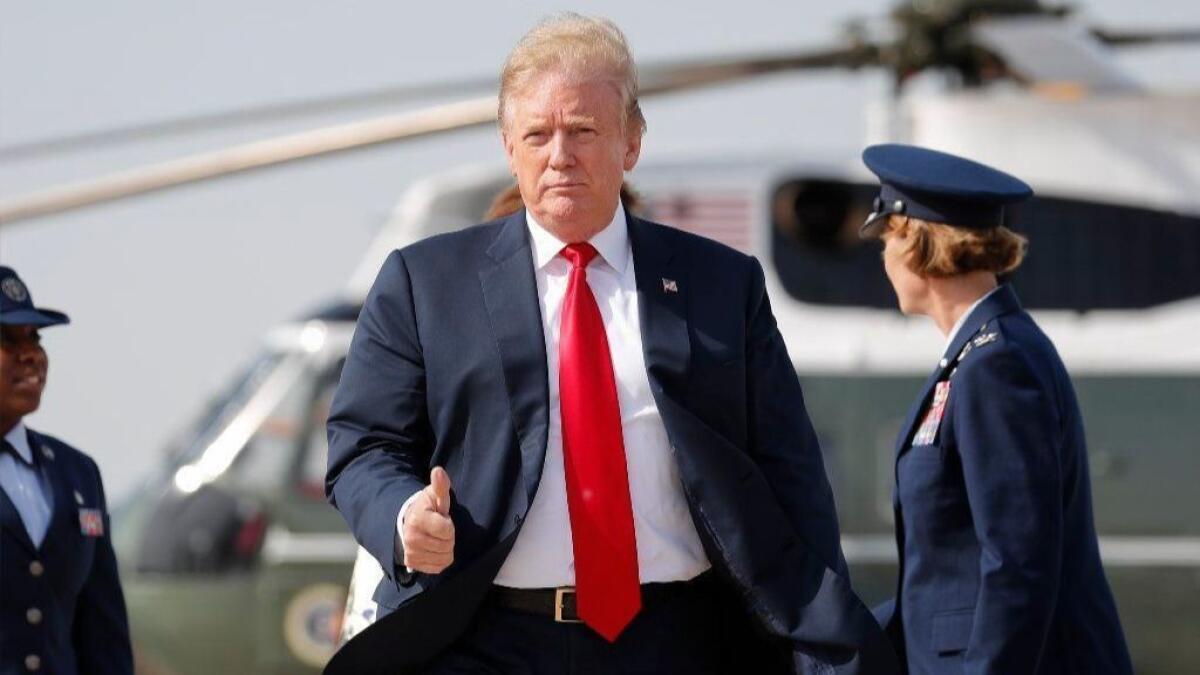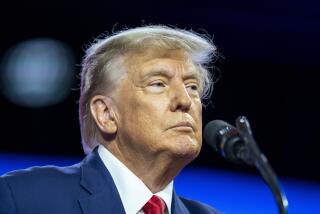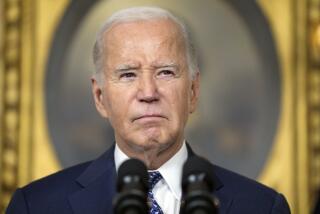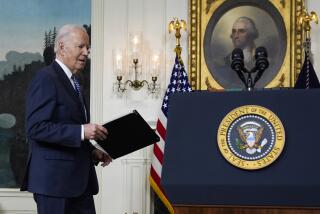Trump blasts Mueller report as Democrats demand unredacted version

President Trump blasted special counsel Robert S. Mueller III’s final report on Friday as “total bullshit,” while the Democratic leader of the House Judiciary Committee issued a subpoena for the unredacted report and its underlying materials.
Although he previously claimed that Mueller’s report amounts to a “total exoneration,” Trump angrily dismissed the myriad claims made by senior White House aides and associates throughout the 448-page report as false and cast the document itself as politically motivated.
“Statements are made about me by certain people in the Crazy Mueller Report, in itself written by 18 Angry Democrat Trump Haters, which are fabricated & totally untrue,” Trump tweeted Friday in his most detailed comments since the redacted report was released Thursday.
“Watch out for people that take so-called ‘notes,’ when the notes never existed until needed,” he continued, apparently referring to former White House counsel Don McGahn, who provided his contemporaneous notes to investigators.
Despite months of negotiations between the White House and Mueller’s team, Trump refused to sit down for an interview with Mueller and provided only written responses to questions in which he mostly claimed not to recall many of the episodes and conversations under scrutiny.
Mueller called the president’s written answers “inadequate,” but said he decided not to seek a subpoena because it likely would spark a lengthy court battle that would delay release of the report.
On Friday, however, Trump complained that he was unable to push back on the claims made by his aides in Mueller’s report.
“Because I never agreed to testify, it was not necessary for me to respond to statements made in the ‘Report’ about me, some of which are total bullshit & only given to make the other person look good (or me to look bad),” he said in a second tweet before heading off for a round of golf in Palm Beach, Fla.
After issuing only terse comments about the report’s release on Thursday, Trump’s tweets at the outset of the Passover and Easter weekend signaled that he remains in damage control mode, fixated on embarrassing details in the report and frustrated that he will continue to govern beneath a cloud of investigations in Congress and elsewhere.
Democrats, already investigating Trump’s tax returns, business dealings and relationship to Russia, wasted little time in asking to see Mueller’s full, unredacted report.
In his subpoena request Friday, Democratic Rep. Jerrold Nadler of New York, chair of the Judiciary Committee, asked for the information by May 1. That’s the same day that Atty. Gen. William Barr is scheduled to testify before a Senate committee and one day before Barr is set to appear before Nadler’s committee.
The subpoena is the opening shot in what could be a lengthy legal and political battle. A number of the pages in the report had blacked-out material from grand jury testimony, intelligence sources and methods, and other protected information.
“Even the redacted version of the report outlines serious instances of wrongdoing by President Trump and some of his closest associates,” Nadler said in announcing the subpoena. “It now falls to Congress to determine the full scope of that alleged misconduct and to decide what steps we must take going forward.”
A spokesperson for Barr called Nadler’s request “premature and unnecessary” given that the Justice Department released the report with what they called “minimal redactions,” but vowed to work with Congress to accommodate “its legitimate requests.”
If the Justice Department doesn’t respond to the subpoena, Democrats could hold officials in contempt of Congress or eventually fight the battle in court.
The Judiciary Committee voted 24 to 17 earlier this month to give Nadler permission to issue subpoenas to obtain the full report, its exhibits and any underlying evidence or materials prepared for Mueller’s investigation into Russian interference in the 2016 presidential election.
Mueller concluded that Trump’s campaign did not knowingly coordinate with Russian officials who sought to help him during the 2016 election. But the special counsel left it to Congress to determine whether his efforts to curtail and mislead investigators, many of which are detailed in the report, amount to obstruction of justice.
One Republican, Sen. Mitt Romney of Utah, said in a statement that Mueller’s determination that Trump did not conspire with Russian officials is “good news” in that a potential constitutional crisis can be avoided. But he also said he was “sickened at the extent and pervasiveness of dishonesty and misdirection by individuals in the highest office of the land, including the president.”
Trump’s legal team had prepared its own “counter report” responding to Mueller, but indicated Friday that it no longer plans to release it. “At this point unnecessary,” Trump attorney Rudolph W. Giuliani wrote in a text message.
According to two administration aides, Trump was pleased with Barr’s news conference Thursday, during which he repeatedly stated that Mueller’s team found no “collusion” between the Trump campaign and Russia, and said the evidence did not merit charging Trump with obstruction of justice.
But Barr’s attempt to characterize the evidence as favorable to Trump at a press conference 90 minutes before he released the report to Congress or the public troubled Nadler and many Democrats.
In a radio interview Friday, Nadler challenged Barr’s claim that Mueller’s decision not to make a recommendation on whether Trump obstructed justice was unrelated to a longstanding opinion from the Office of Legal Counsel that a sitting president cannot be charged with a crime. Mueller wrote that the guidance was a major consideration.
“They stopped the investigation on obstruction at a certain point because [Mueller] didn’t want to be in a position where he had so much damning material that he would have to indict, except he couldn’t because of the policy,” Nadler said.
About 12% of the report released Thursday was redacted. It largely corroborated two years of journalistic accounts of a White House beset by infighting under an executive with a penchant for lying to his staff and an expectation that they would lie for his benefit.
It is based on interviews with scores of current and former administration officials, all of whom are named in the report. Among the aides who provided Mueller with notes are McGahn, former staff secretary Rob Porter, former Chief of Staff John F. Kelly and former deputy national security advisor K.T. McFarland.
Mueller’s finding that Trump instructed McGahn to fire Mueller in 2017, an order the attorney ultimately refused to carry out, is based on McGahn’s own firsthand account.
In one exchange depicted in the report, Trump questioned McGahn about his note-taking.
“Why do you take notes? Lawyers don’t take notes. I never had a lawyer who took notes,” Trump reportedly said. McGahn responded that a “real lawyer” does.
Trump shot back that he’d had “a lot of great lawyers,” including Roy Cohn, who he argued “did not take notes.”
Cohn, who won notoriety as chief counsel for Sen. Joseph R. McCarthy’s communist-hunting committee in the 1950s, ultimately was disbarred for unethical practices.
The White House press secretary, Sarah H. Sanders, was also on the defensive Friday.
The report revealed that she admitted to investigators that she lied when she told reporters during a briefing in May 2017 that the president had heard expressions of gratitude from “countless” FBI agents after he fired the agency’s director, James Comey.
Sanders told Mueller’s team that her claim was a “slip of the tongue,” even though she repeated it several times to reporters in the days following Comey’s firing.
Mueller determined that Trump fired Comey out of frustration that he wouldn’t publicly defend the president and forced Deputy Atty. Gen. Rod Rosenstein to draft a letter recommending his firing to use as pretext.
On Friday, Sanders sought to retain credibility as the administration’s top spokesperson, disputing Mueller’s determination that her claim of hearing from countless FBI agents “was not founded on anything.”
“Actually, those were Mueller’s words that they weren’t founded on anything,” Sanders said on ABC’s “Good Morning America.” “I said that it was in the heat of the moment, meaning it wasn’t a scripted thing. It was something that I said and which is why that one word has become a big deal. But the big takeaway here is that the sentiment is 100% accurate.”
Times staff writers Chris Megerian and Jennifer Haberkorn contributed to this report.
More to Read
Get the L.A. Times Politics newsletter
Deeply reported insights into legislation, politics and policy from Sacramento, Washington and beyond. In your inbox three times per week.
You may occasionally receive promotional content from the Los Angeles Times.







